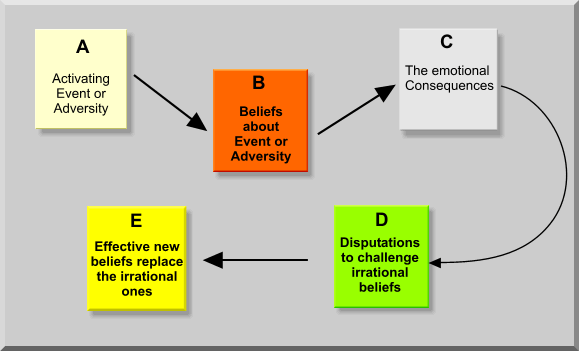Have you ever noted that one depression causing
thought or cognition begins with “I’ll never......” So when you fail in some
exam.... or your third or fourth relationship doesn't work out, you say “I’ll
never pass this exam or I’ll never have a good relationship”. Aaron Beck, the
father of cognitive therapy, would ask you to find evidence for your notions
and encourage you to see that even a series of failure doesn't make you a
failure.

Thinking alone doesn’t trouble, it’s the feeling associated with it which is troublesome. Ellis in his rational emotive behaviour therapy says people create problem by turning their preferences into needs. We prefer to have ...a good income, a good relationship, being attractive and thereby create beliefs of... I must have a good income, I can’t stay without a loving fulfilling relationship etc. What we do is, we jump from I like to I must. We have a rigid belief that “I need and must have the things I really want”. These ideas are what Ellis called irrational beliefs. They are absolute, rigid and demanding. These beliefs are irrational because they cannot be empirically or logically verified.
Where do these irrational beliefs come from? We are born with tendencies towards rational and irrational thinking. We have a tendency to give meaning and inferences to everything around us. We pay attention to negative information more readily than positive information. Along with the “must” thinking, self evaluation is another major cause of our distress.
Ellis Rational Emotive Therapy utilizes techniques from a wide range of approaches. However, its central technique is disputing. Disputing is logical challenging of irrational beliefs. You should attack your beliefs, find evidence for and against them. Try replacing them with more rational beliefs and ideas.
Moreover, sometimes these irrational beliefs affect our behaviour too. The effect of our cognition on our behaviour and how to tackle the same is represented by Ellis’s ABCDE model where “A” is the Activating or triggering event. “B” refers to our irrational Belief about the event at “A.” That belief then leads to “C,” the emotional and behavioral Consequences. “D” stands for Dispute or arguments against irrational beliefs. “E” stands for new Effective or rational emotions and behaviors that result from more reasonable thinking about the original event. This is an effective method to challenge ones irrational thoughts and beliefs.
Situations, events, feelings are not good or bad, it’s our perception and inferences which make them so. As I mentioned before, nothing good comes easy, you’ll have to make an obvious effort to achieve it. There is no absolute reality. Its not possible to achieve everything we want. We try, we fail, we try again ... this is how life goes. We all are fallible human beings. Ask yourself the Socratic question “So what?” So what, If your boss was rude to you? So what, if you failed in your exam? So what, if your friends think you are fat? It cannot change who you really are. Strive for excellence not perfection. Start valuing yourself. You are far more resilient than you think you are!!!!


No comments:
Post a Comment